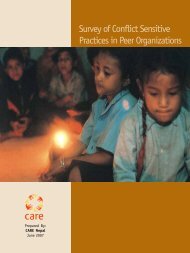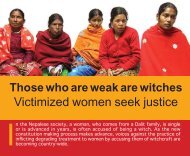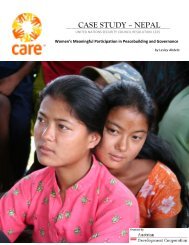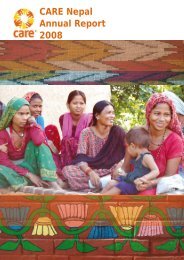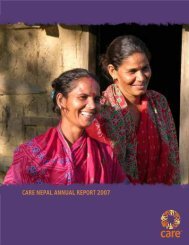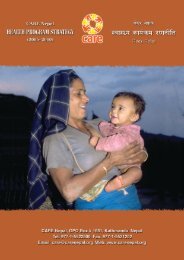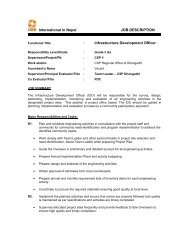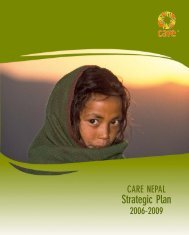Untitled - Care Nepal
Untitled - Care Nepal
Untitled - Care Nepal
Create successful ePaper yourself
Turn your PDF publications into a flip-book with our unique Google optimized e-Paper software.
Interpretation of Findings<br />
Findings are interpreted from the<br />
perspective of community based<br />
service providers. Some of the<br />
members of research team went to Chitwan<br />
and had meeting with community<br />
psychosocial workers. Firstly, key findings<br />
were shared with community based<br />
psychosocial workers and then the causes<br />
and consequences of problems to the lives<br />
of women were explored. At the same time,<br />
information collected during the research<br />
was also verified by the community based<br />
psychosocial workers.<br />
RESULT OF POLITICAL<br />
VIOLENCE TO WOMEN<br />
Women are more threatened because both<br />
the conflicting parties believed that with<br />
fear women will give away all the<br />
information. The threat creates more fear<br />
in women. Men mostly are not intimidated<br />
easily even when they are threatened. The<br />
reason mentioned was that women are<br />
mostly confined within the house wall or<br />
nearby so they lack confidence. Women are<br />
not sure on how to interact with strangers.<br />
They don’t feel confident while speaking<br />
with the strangers. Whereas men are mobile,<br />
they go out, they get time to meet and talk<br />
with many people. They are exposed to many<br />
people and many incidences. Hence they<br />
are able to see and understand other people’s<br />
problem and are able to resist and cope with.<br />
Furthermore, women feared for their safety.<br />
There have been incidences that strangers<br />
have come as guests to spend a night or so<br />
(batuwa), have stayed in the house and stolen<br />
things at night. Men came as Maoist or as<br />
army personnel to spend night; the women<br />
have heard incidences where such men have<br />
raped the women of the house where thy<br />
have stayed. Hence, women fear strange<br />
men, they find it hard to trust the stranger.<br />
If the male family member is around and a<br />
stranger comes, the women do not fear.<br />
They feel safer if their men are around.<br />
Presence of stranger together with their<br />
husbands feels much more secure than<br />
alone. Hearsay of dreadful incidences such<br />
as men being locked in one room by<br />
strangers and women being raped has<br />
created fear and disbelief among women in<br />
the village.<br />
During the period of conflict, women felt<br />
that it was good that their men were not at<br />
home. Women felt that their men were safe<br />
when they were out of village. Women did<br />
not want their men to join the armed groups<br />
as they felt it was not at all safe. The<br />
communities used to have informal<br />
conversations that young men were taken<br />
away by armed groups; hence they<br />
encouraged their young men, brothers etc<br />
to go outside their village even if they<br />
worked as daily wage laborers. Women<br />
seemed content if they were sure their<br />
husbands or male members of the family<br />
were safe.<br />
36<br />
Psychosocial Issues of<br />
Women affected by conflict



